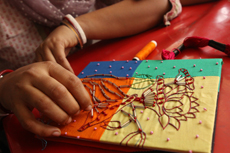|
 |
|
A Ruaab worker beads a cushion
cover |
New Delhi: Marginalised Muslim craftswomen and weavers in Uttar Pradesh,
Bihar and in the capital are making an international connection
with their work thanks to two projects by the Self-Employed
Women's Association (SEWA), one of the country's oldest crafts and
women's empowerment organisations.
One project, "Ruaab: SEWA Artisans Producer Company", is
empowering nearly 1,500 Muslim women in the eastern fringe of the
capital with full-time jobs as embroiderers and designers to
international brands like Zara, Gap Inc-Banana Republic, Monsoon,
NEXT, Newlook and Vero Moda.
The women work both at the SEWA centres and out of their homes.
Another cooperative project with 100 Bhagalpur silk weavers in
Bihar is empowering at least 90 Muslim families with women leading
the trade, a spokesperson for the organisation said.
Their creations, mostly saris and yardage, are finding global
platforms through the foreign missions like the German, American
and Canadian embassies in India, the government's Handloom
Commission, Silk Mark and private organisations like KPMG and
Aircel.
In April, hundreds of Muslim women weavers employed with SEWA
created a range of embroidered home furnishings - mostly
hand-beaded cushions - for London-based designer Tracey Boyd's "Aboydbazaar"
- a show marking his return to the world of accessory and apparel
design after a small break.
Boyd was named the New British Designer Of The Year in 2000.
"The cushions were embellished with 'Ari' thread embroidery and
beadwork," SEWA designer Pallavi Yadav told IANS at a showcase of
Ruaab in the capital Friday.
Yadav said: "The SEWA centres in east Delhi, which are
Muslim-dominated, has more than 350 regular Muslim workers and
over 700 home-based workers."
Most of these workers are migrants from Uttar Pradesh and Madhya
Pradesh who come in search of better livelihood.
The women have learnt the traditional "Ari" thread work from their
native villages in districts like Barielly and Bulandsahar.
The "Ari" embroidery is a variation of the Kashmiri "addawork"- an
intricate thread craft, Yadav said.
"It is a common sight in the resettlement slums in east Delhi to
find these women sitting outside their houses with a piece of
fabric tied to a long "adda", a wooden frame on which they
embroider," Yadav said.
Ruaab also has centres in the Muslim-dominated villages of Uttar
Pradesh.
The organisation, which was set up in 1972 by Ela Bhatt in
Gujarat, works in nine states across India.
"In Bhagalpur district in Bihar, where the traditional handloom
weavers have been battling powerloom and the nexus of middlemen in
the silk trade, SEWA has been trying to link them to the market
with the help of SEWA Saheli, its cooperatve", the director of
SEWA Bharat told IANS.
The weavers are paid Rs.600 per sari against the Rs.500 paid by
the government, and Rs.250 by middlemen, said Neha Saini,
marketing coordinator for the organisation's Bhagalpur project.
For the illiterate and poor Muslim women, who have never been out
of the confines of their homes, the formal engagement with SEWA
has been socially and psychologically empowering.
They can now go out unescorted, speak to people. The core group of
sample crafts people - who make samples for international brands -
now have developed international fashion consciousness.
"We took a few women to London a couple of years ago to show them
the brand headquarters to which they supplied. They now suggest
their own inputs for the designs," Yadav said.
Confidence shines like an armour in the faces and body language of
Tabassum, Taslim and Zeenat - three full-time "ari" thread workers
from Sundernagar near Noida in east Delhi.
They say working for SEWA has taken the insecurity out of their
lives.
"I don't want to work anywhere because SEWA pays well. I make
around Rs.5,000 a month and live comfortably with my family of
three children. I worked for a middleman earlier who paid me
Rs.2,500," Taslim, a migrant craftsperson from Bulandshahr, told
IANS.
Tabassum has built a home together with her husband, a shoe-maker,
after joining SEWA.
Zeenat, who lives with her sister, a migrant bangle-maker from
Barielly, has overcome her shyness of strangers and "is allowed to
go out of home alone".
(Madhusree
Chatterjee can be contacted at madhu.c@ians.in)
|



















